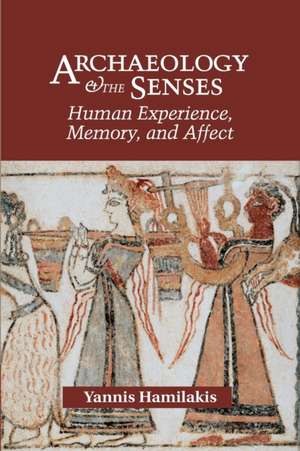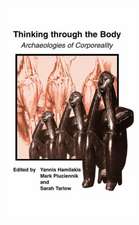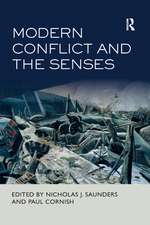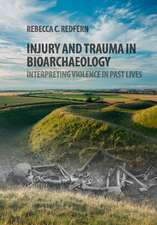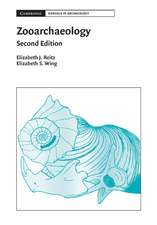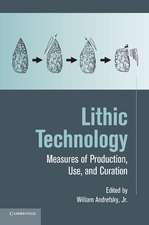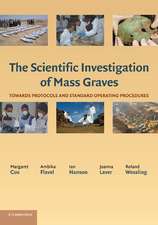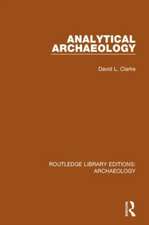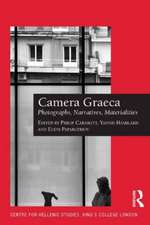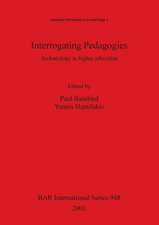Archaeology and the Senses: Human Experience, Memory, and Affect
Autor Yannis Hamilakisen Limba Engleză Paperback – 15 iul 2015
| Toate formatele și edițiile | Preț | Express |
|---|---|---|
| Paperback (1) | 284.01 lei 6-8 săpt. | |
| Cambridge University Press – 15 iul 2015 | 284.01 lei 6-8 săpt. | |
| Hardback (1) | 698.50 lei 6-8 săpt. | |
| Cambridge University Press – 19 ian 2014 | 698.50 lei 6-8 săpt. |
Preț: 284.01 lei
Nou
Puncte Express: 426
Preț estimativ în valută:
54.34€ • 56.89$ • 44.97£
54.34€ • 56.89$ • 44.97£
Carte tipărită la comandă
Livrare economică 05-19 aprilie
Preluare comenzi: 021 569.72.76
Specificații
ISBN-13: 9780521545990
ISBN-10: 0521545994
Pagini: 270
Ilustrații: 26 b/w illus.
Dimensiuni: 152 x 229 x 14 mm
Greutate: 0.36 kg
Editura: Cambridge University Press
Colecția Cambridge University Press
Locul publicării:New York, United States
ISBN-10: 0521545994
Pagini: 270
Ilustrații: 26 b/w illus.
Dimensiuni: 152 x 229 x 14 mm
Greutate: 0.36 kg
Editura: Cambridge University Press
Colecția Cambridge University Press
Locul publicării:New York, United States
Cuprins
1. Demolishing the museum of sensory ab/sense; 2. Archaeology, modernity, and the senses; 3. Recapturing sensorial and affective experience; 4. Senses, materiality, time: a new ontology; 5. Sensorial necro-politics: the mortuary mnemoscapes of Bronze Age Crete; 6. Why 'palaces'? Senses, memory, and the 'palatial' phenomenon in Bronze Age Crete; 7. From corporeality to sensoriality, from things to flows.
Recenzii
'This book goes far beyond a study of archaeology, the past, and the traditional senses of the modern Western world. It presents an innovative strategy that, through a broad approach to a sensorially inspired archaeology, enables the past to be written as a rich and affective palimpsest, while maintaining the standards and rigors of archaeological investigation.' Ruth Tringham, University of California, Berkeley
'This is an extremely well-researched book which draws heavily on philosophical, historical, and anthropological thinking but embeds it excellently within the relevant archaeological literature. It should be attractive to all students and academics who wish to challenge the conventions of archaeological interpretation - it forms an important statement that future archaeologists may in time regard as a classic.' Paul Rainbird, University of Bristol
'Richly evocative, theoretically innovative, and written by a leading figure in the field, Archaeology and the Senses opens up new terrain in the anthropology of the senses. The accessibility of this book will make it a touchstone for scholars and students interested in new approaches to the interpretation of material objects.' David Sutton, Southern Illinois University
'… a valuable study of cultural thinking - and a very enjoyable one to read at the same time … [Hamilakis] produces a fact-based, culturally sensitive and theoretically subtle reading which, although at first might not seem groundbreaking, is in fact exactly that.' Dimitris Plantzos, Historein
'Despite the complex philosophical and historical analysis in the first half of the book, it is an accessible work that does not require specialist knowledge to decipher, something the author should be proud of.' Kay Armstrong, Antike Welt
'Anyone familiar with Hamilakis' output will recognise recurrent themes in this book: memory, personhood, commensality, reflexivity, politics and, of course, the senses. Pulling these topics together, the book represents a significant statement by one of the leading thinkers within archaeology.' Jo Day, Antiquity
'This is an extremely well-researched book which draws heavily on philosophical, historical, and anthropological thinking but embeds it excellently within the relevant archaeological literature. It should be attractive to all students and academics who wish to challenge the conventions of archaeological interpretation - it forms an important statement that future archaeologists may in time regard as a classic.' Paul Rainbird, University of Bristol
'Richly evocative, theoretically innovative, and written by a leading figure in the field, Archaeology and the Senses opens up new terrain in the anthropology of the senses. The accessibility of this book will make it a touchstone for scholars and students interested in new approaches to the interpretation of material objects.' David Sutton, Southern Illinois University
'… a valuable study of cultural thinking - and a very enjoyable one to read at the same time … [Hamilakis] produces a fact-based, culturally sensitive and theoretically subtle reading which, although at first might not seem groundbreaking, is in fact exactly that.' Dimitris Plantzos, Historein
'Despite the complex philosophical and historical analysis in the first half of the book, it is an accessible work that does not require specialist knowledge to decipher, something the author should be proud of.' Kay Armstrong, Antike Welt
'Anyone familiar with Hamilakis' output will recognise recurrent themes in this book: memory, personhood, commensality, reflexivity, politics and, of course, the senses. Pulling these topics together, the book represents a significant statement by one of the leading thinkers within archaeology.' Jo Day, Antiquity
Notă biografică
Descriere
An exciting look at how archaeology has dealt with the bodily senses and how it can offer a richer glimpse into the human sensory experience.
